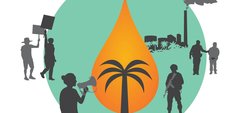Global Witness | 9 December 2020
Indonesia palm oil traders are failing land and environmental defenders
Our new investigation uncovers how two major US commodity traders – ADM and Bunge – are failing to ensure that the hundreds of Indonesian palm oil mills they source from in Indonesia are free from abuse against land and environmental defenders.
This failure to identify and prevent human rights abuses and conflict in their supply chains means that consumers may unknowingly be buying conflict-tainted palm oil in products shipped around the globe from some of the world’s biggest brands such as Nestlé and Unilever.
Key Findings
ADM and Bunge are failing to ensure compliance with national laws and international standards, as well as their own policies.
- Nearly 40% of the sampled mills supplying both ADM and Bunge have, according to credible reports, been accused of violating local community land rights, criminalising or attacking defenders, and/or causing serious environmental degradation
- The majority of these allegations have occurred in the past five years, and 17% of the mills had active and ongoing conflicts in 2019 and 2020. Nine of these disputes had been going on for a decade or more and were the subject of multiple media reports.
- Local communities accused 26% of the mills in our reviewed sample of having seized community-owned land. In eight of these cases it was explicitly reported that the community had been evicted from their lands, though the true number of unreported evictions may be higher.
- Violent confrontations between mill or state-security forces and communities were reported for conflicts involving 13 mills, usually resulting from a long-standing land dispute.
- ADM and Bunge failed to mitigate, investigate or remedy the impacts of their suppliers’ operations on land and environmental defenders.
Palm oil's links to environmental and human rights abuses
Palm oil is big business in Indonesia. It is the country’s most valuable agricultural export, and Indonesia is the largest palm oil exporter in the world. But the industry has historically been tainted by abuse, from deforestation to pollution and violations of community rights.
Land and environmental defenders – those communities and individuals that take a stand against the unjust, discriminatory, corrupt or damaging exploitation of natural resources and the environment – have often faced violent reprisals for their work in opposing palm oil expansion.
Indonesia is one of the deadliest countries in Southeast Asia for land and environmental defenders, with at least 12 defenders killed there since 2015.
Under international standards, global agribusiness companies have a clear responsibility to monitor and address the human rights and land rights abuses in their supply chains. Yet our investigation shows that neither ADM nor Bunge have sufficient checks or mitigation processes in place to ensure the mills they source from are free from these harmful impacts on local communities.
ADM rejected Global Witness’ evidence base and our analysis of their due-diligence process. However, ADM investigated all mills identified in this report as linked to land and human rights abuses. ADM replied to Global Witness that it would be monitoring 9 mills identified in our report, and continuing investigations on a further 36 mills. It closed investigations or otherwise declined to investigate the remaining mills.
Bunge acknowledged that the alleged incidents were in Bunge’s indirect supply and reiterated that the company includes credible instances of human rights violations in its grievance list for engagement.
Both traders have palm oil supply chain links to major global buyers, ultimately implicating some of the world’s biggest brands such as Nestlé and Unilever, among others, in these abuses.
Recommendations
ADM and Bunge should:
- Adopt a public policy position on human rights defenders that includes a zero-tolerance stance on threats and violence against defenders, with the explicit inclusion of those at highest risk, namely land and environmental defenders.
- Adopt a public policy position on the prevention of land rights abuses across their supply chains, including a zero-tolerance stance on illegal land acquisition, and to ensure the right of free, prior and informed consent (FPIC) for affected communities.
- Adopt and implement effective systems to implement these policies throughout their supply chains and operations and publicly disclose measures used to identify and address risks faced by defenders.
- Ensure effective mitigation and remedy processes are developed and implemented for where adverse impacts are identified.
- Champion land and environmental defender issues with governments, including the Indonesian government, using their commercial and political leverage to press for greater respect for defender rights.
The Indonesian government should:
-
Respect, protect and fulfil the rights of human rights defenders in line with the UN Declaration on Human Rights Defenders, and investigate and prosecute perpetrators of violations against them, including the intellectual authors of these crimes.
- Strengthen the recognition and protection of indigenous territorial and customary rights.













